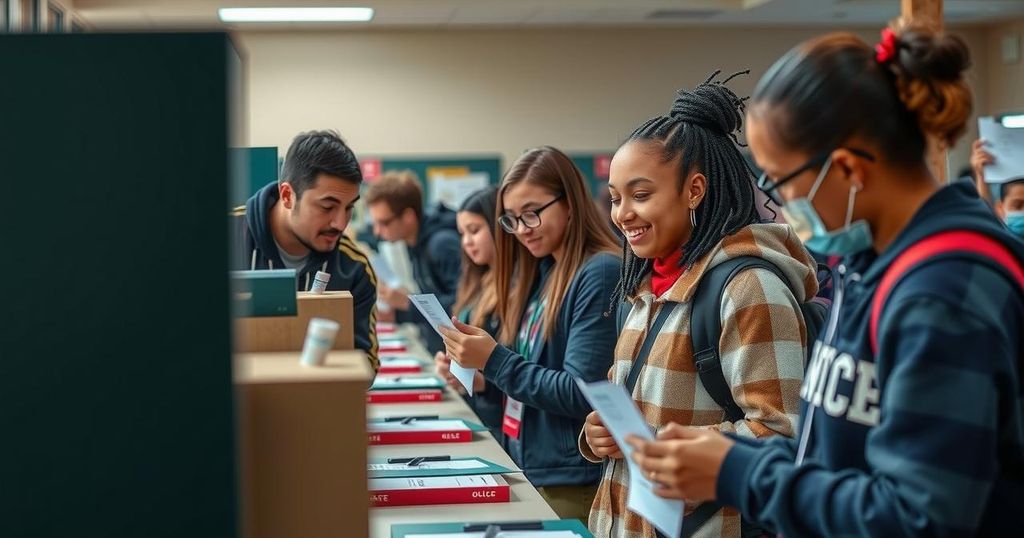As North Carolina’s early voting continues, Charlotte-Mecklenburg high school students are also participating in elections for the 2025 student advisor to the School Board. With ten finalists from various schools, students from grades 9-12 have the opportunity to vote from October 21 to November 5. The student advisor, a role created for student representation, does not vote but provides input to the board. Applications increased significantly this year, indicating strong student interest in advocating for their peers.
As early voting progresses across North Carolina, Charlotte-Mecklenburg Schools (CMS) high schoolers are also participating in the electoral process by voting for the position of the 2025 student advisor to the Charlotte-Mecklenburg Board of Education. This year, ten students, comprising eight juniors and two sophomores, have been selected as finalists for this pivotal role, to which all CMS students in grades nine through twelve are empowered to cast a vote between October 21 and November 5, coinciding with Election Day. The student advisor position, established in 2016, aims to foster a connection between students and the Board, providing a platform for student concerns to be heard. Although this advisor does not have voting rights on the board, they actively participate in meetings and contribute to discussions, representing student perspectives. Additionally, the student advisor assumes a leadership role within the Charlotte-Mecklenburg Youth Council, collaborating with CMS, Mecklenburg County, and the city of Charlotte as well as with the nonprofit partner, Generation Nation. The selected advisor will serve a one-year term starting in January and ending in December 2025. The current student advisor, Ailen De Bonis, a senior at Ardrey Kell High School, applauds the rise in applications for this position, which saw a significant increase of 59% from the previous year. The 148 applications received in 2024 were the highest to date, indicating heightened interest among students from all comprehensive high schools within the district. Dee Rankin, vice-chair of the Board of Education, noted, “The student advisor plays an important role in Board thinking and decisions… Students saw this as a real opportunity to help inform Board decisions through their student perspective.” Among this year’s noteworthy finalists is Gabriel Guerra Barceló from Charlotte Engineering Early College, who aims to advocate for minority students’ needs. Quinten Canty from West Charlotte High School raises a voice for underrepresented communities. Tatiana Collins, representing Independence High School, emphasizes student engagement with board activities. Alejandra Flores of Olympic High School focuses on creating a safe environment for all students and seeks adjustments in school absence policies. Sydney Glover from Garinger High School aims to foster communication between the board and students. Katelyn Morton of Northwest School for the Arts advocates for arts education resources, advocating for equitable access to educational tools and resources. Ngozi Nwauwa, a tenth grader at East Mecklenburg High School, strives to ensure all students have access to academic support. Lucy Silverstein of Providence High School seeks to enhance inclusivity and mental health resource availability, highlighting her personal challenges with ADHD and dyslexia as motivators for advocacy. Finally, Madden Wilkinson of Hopewell High School, an active member of the JROTC, emphasizes the necessity of mental health resources, calling for increased student engagement with board activities.
The student advisor position to the Charlotte-Mecklenburg Board of Education serves a crucial purpose in bridging the gap between student bodies and education policymakers. Established to enhance student representation within local governance, this position enables high school students to voice their concerns and perspectives on education-related matters directly to the board. The increase in applications points to a rising recognition of the importance of student advocacy and engagement in shaping educational policies and practices. Elections for the student advisor also coincide with significant state and national elections, promoting a culture of civic engagement among young individuals. The initiative aims to empower students, allowing them to participate actively in their educational contexts, thereby enhancing their sense of agency and responsibility within the school system and community.
In summary, the participation of CMS high schoolers in the voting process for the student advisor position illustrates a significant shift towards greater student involvement in educational governance. This initiative encourages youth to take an active role in their educational environment, with the aim of ensuring that their voices and concerns are represented in decision-making processes. The candidates’ diverse backgrounds and objectives reflect the varied interests of students, showcasing a commitment to advocacy and inclusive representation within the Charlotte-Mecklenburg educational landscape.
Original Source: www.charlotteobserver.com






